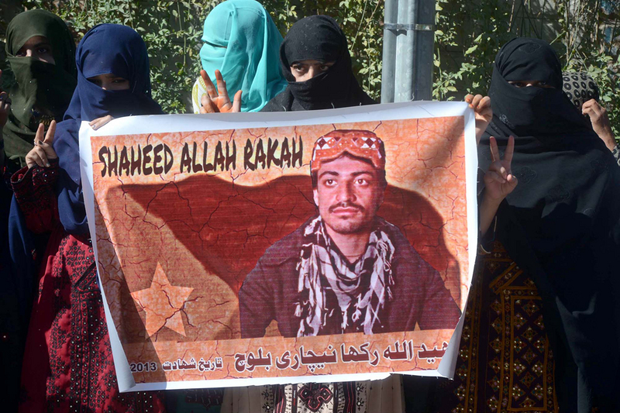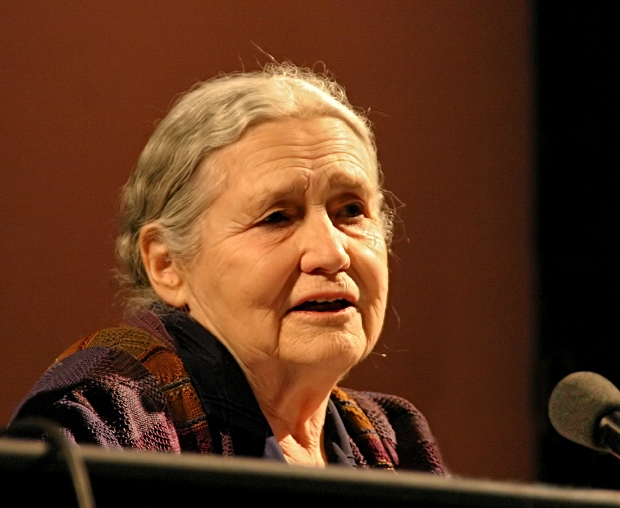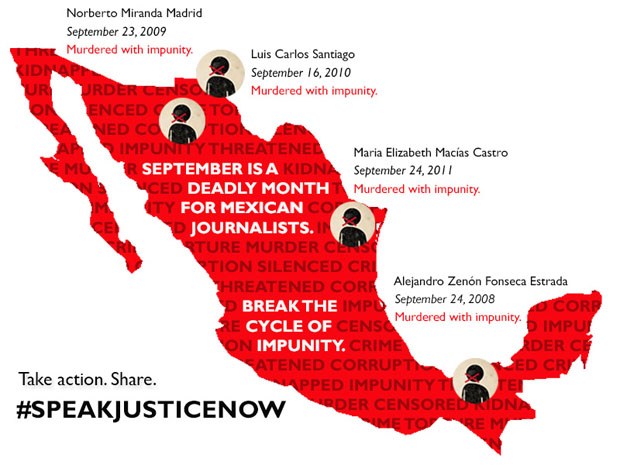Index relies entirely on the support of donors and readers to do its work.
Help us keep amplifying censored voices today.

Members of Baloch Shohada Committee lighten candles during a protest against Baloch genocide on the occasion of Youm-e-Shohada-e-Baloch. (ppiimages / Demotix)
Farzana Majeed holds Pakistani media as responsible for the disappearances of thousands of Baloch nationalists as the state security apparatus, labelling it a “very willing accomplice.”
29-year old Majeed is among the two dozen people on a long march organised by the Voice of Missing Baloch Persons (VOMBP) which has protesting for the last four years. They are demanding the return of their loved ones, who they allege have been illegally apprehended and detained by Pakistan’s intelligence and security agencies.
“The media should be the voice of the victims and report on the atrocities committed on our people; instead they are pressured into silence by the state”, she said.
The march began on October 27 from Quetta in Balochistan covering a distance of almost 700 km, and will reach Karachi, in the Sindh province, by the end of the week. There, outside the Karachi Press Club, they will hold an indefinite sit-in and hunger strike. The marchers started with covering anywhere between 35 to 40 km/day, but blisters and illness are slowing down progress to barely 25km a day.
The mineral-rich Balochistan is the largest of the four provinces of Pakistan, and was an independent state until 1947, when Pakistan annexed its eastern side and Iran its western side. For many Baloch families, since the disappearances began more than a decade back, life has not been the same.
According to Qadeer Baloch who founded the VOMBP, around 18,000 Baloch nationalists, including doctors, professors, politicians and students, have been abducted since 2001. “We have received mutilated corpses of 1,500 of them.”
Farzana Majeed’s brother Zakri was abducted four years ago from the city of Mastung. He was the vice president of the Baloch Students Organisation (Azad), a nationalist student group raising awareness of the rights of the Baloch on campuses. Despite holding a double master’s in biochemistry and Balochi language, Majeed said her life has been put on “on hold” and her three siblings and mother rendered “homeless” since Zakri’s disappearance. She hasn’t heard any news of him for three years.
Baloch’s own son Jalil Reiki, the information secretary of Baloch Republican Party, was picked up in 2009. Almost two years and eight months later, his tortured and bullet-riddled body was found.
“The disappearances started way back in 2001 during president Pervez Musharraf’s rule but this human rights abuse came on public radar in 2004-05 after the women — mothers, sisters and wives — started coming out and began protesting,” explained Malik Siraj Akbar, editor of online English newspaper The Baloch Hal. He said Baloch women hardly ever come out publicly and so when they did, they were bound to be noticed.
“Except for BBC, and a couple of English national dailies, no other media is supporting us,” said Baloch, who is leading the march. The lukewarm response, however, has failed to deter the marchers. “It is a way of teaching our coming generation the value of speaking up,” Baloch told Pakistan’s Dawn newspaper.
“Some of our friends in the media have disclosed that the intelligence agencies have warned and threatened them from covering our peaceful protest; others have been told that we are causing bad publicity internationally,” he added.
Akbar, who has taken asylum in the United States after most of his friends and colleagues were killed, said: “I know the agencies have been threatening the protesters with dire consequences and forcing them to shut down their camps and end the rally.” However, he added that he was not aware of any “threats or pressure on the media from the agencies and the government”.
But according to the chairperson of the independent Human Rights Commission of Pakistan, Zohra Yusuf, “journalists in Balochistan are under pressure from the Frontier Corps [federal reserve military force], the Baloch separatists as well as the religious extremists”.
Mazhar Abbas, a former secretary general of the Pakistan Federal Union of Journalists, speculated that the poor coverage of the march, as well as the issue of disappearances, may be due to the “influence used on media barons by the intelligence agencies”.
While he emphasised the electronic media had covered the Supreme Court hearings around the issue at length, he found it had never been tackled properly from a human rights angle. He lamented the “non-professional” attitude of the print media which did not find the issue grave enough to do investigative reporting on it.
The missing are no longer an “exciting” story so they are not covered by the national media, Akbar said. “Unfortunately, nobody seems to care much about it in a country where dozens of people are killed every day,” he said.
Zohra Yusuf also said the urban-based media did not seem particularly interested in the issue as it was more “ratings oriented”.
As for the on-going march not able to attract media’s attention, Abbas suggested that had it been led by “known political or nationalist figures”, it would have automatically lured the media to it.
A recent HRCP report, based on a fact-finding mission to Balochistan, stated that while the people of the province have pinned their hopes on the new government to address the problems, especially regarding the “grave human rights violations”, many do not see any visible policy change “within the security and intelligence agencies”, as the “kill-and-dump policy” continued.
According to Malik Siraj Akbar, while the ongoing long march isn’t any different from past demonstration, it is the “first major protest” since the new governments in the province and the centre took over the reins.
“The long march reflects the new government’s failure to resurface the missing persons and normalise the situation in Balochistan,” he pointed out.
This article was originally published on 20 Nov 2013 at indexoncensorship.org

It is an astonishing fact that Zimbabwe, after 20 years of a rule that has starved libraries and schools of books, is full of people who yearn for books, who see them as a key to a better life, and whose attitude is similar to that of people in Europe and the USA up to 50 years ago who read because they agreed with Carlyle’s dictum ‘the real education is a good library’ — and aspired to be educated.
There are libraries and libraries. Some I am involved with would not be recognised as such in more fortunate parts of the world. A certain trust sends boxes of books out to villages which might seem to the illinformed no more than clusters of poor thatched mud huts, but in them may be retired teachers, teachers on holiday, people with three or four years of education who yearn for better. These villages may have no electricity, telephone, running water, but they beg for books from every visitor. Perhaps a hut may be set aside for books, with a couple of shelves in it, or shelves or a trestle may be put under a tree. In a bush village far from any big town, or even a little one, such a trestle with 40 books on it has transformed the life of the area. Instantly study groups appeared, literacy classes — people who can read teaching those who can’t — civic classes and groups of aspirant writers.
A letter from there reads: ‘People cannot live without water. Books are our water and we drink from this spring.’
An enterprising council official in Bulawayo sends out books by donkey car — ‘our travelling library’ — to places where ordinary transport cannot go, because there are no roads, or roads that succumb to dust or mud.
A friend of mine, known to be involved with organisations that supply books, was approached .by two youths in a bush village near Lake Kariba who said, ‘We have built a library, now please give us the books.’
The library was a shelf in a little lean-to of grass and poles, but the books would never succumb to white ants or the book-devouring fish-moth, because they would always be out on loan.
A survey was made in the villages and it turned out that what these book-starved people yearn for are romances, detective stories, poetry, adventures, biography, novels of all kinds, short stories.
Exactly what a survey in this country would reveal — that is, among people who still read.
One problem is that these people do not know what is available that they might like if they tried. The Mayor of Casterbridge was a school set book one year and was read by the adults, and so people ask for books by Hardy.
The most popular book everywhere is George Orwell’s Animal Farm. Another that has queues waiting for it is World Tales by Idries Shah, and it is not only the tales themselves, but the scholarly footnotes attached to them which people enjoy. They say of a story, perhaps from the Sudan or the USA, ‘But we have a story just like that.’
One problem is that people, hearing of this book hunger, at once offer to donate their cast-off books. These are not always suitable. Donations would be better. Book Aid International, based in London, sends books out to book-starved countries.
This article was originally published in Index on Censorship magazine, March 1999.
Click here to subscribe to Index on Censorship magazine, or download the app here

(Photo: David von Blohn / Demotix)
This week saw some movement in the debate over NSA and GCHQ surveillance, and a court case that could have very serious consequences.
The court case first. One Wednesday and Thursday, the court of Appeal held a judicial review into the use of Schedule 7 of the Terrorism Act taken by David Miranda, partner of journalist Glenn Greenwald. Miranda was detained in transit at Heathrow airport under Schedule 7 while carrying encrypted documents that had emanated, ultimately, from whistleblower Edward Snowden.
The question was whether the authorities, knowing who Miranda was, what he was likely to be carrying, and his purpose for holding the documents, had a right to detain him under that particular piece of law.
It’s quite technical, but it comes down to whether carrying the documents Miranda was carrying could be seen as an act of terrorism or an act that could potentially aid terrorism (as the government and police argue) or as part of a journalistic enterprise (in essence, what Miranda is arguing).
Index and other organisations have weighed in in support of the argument put forward by Miranda’s team, as we worry that a ruling against Miranda could have serious implications. Journalism can often operate in dubious areas: whether material “leaked” or “stolen” for example, is a question that can have very different answers depending on who you ask.
In this case, the UK government very clearly maintains that the documents have been stolen and should be given back. Furthermore, they believe that they could fall into the hands of the wrong people – terrorists or hostile states, if not in the control of security services.
That, by the way, was very interesting indeed. The Home Office’s case suggested Russia, where Edward Snowden has been granted temporary asylum, is a hostile state.
The other side of this argument is that Miranda was assisting in journalism. This will involve, on occasion, having documents others would rather you did not have. The act of journalism is to sift these documents and decide where the stories lie within them. There was considerable back and forth on what “responsible journalism” constitutes during the hearing, but ultimately, it must be up to an editor what goes into a paper.
The Guardian’s Alan Rusbridger maintains he has acted with absolute responsibility. And GCHQ have as yet not claimed that agents have been endangered as a result of the Guardian’s revelations.
But at a hearing of parliament’s Intelligence and Security Committee (the ISC) on Thursday, spy chiefs insisted that Britain’s enemies were “rubbing their hands with glee” at the Guardian’s publications, and that terrorist chatter online had “gone dark” (i.e. more difficult to trace) since the first stories had appeared.
What next for the surveillance debate? The ISC performance was generally held to be weak. Rory Stewart MP has suggested it be composed more democratically, with an opposition MP at its head. The general demand on surveillance seems fairly low key: more scrutiny, less scope for random snooping.
Meanwhile the judges will mull over the Miranda case, and, we hope, come to the conclusion that whatever the young Brazilian was doing, it wasn’t terrorism.
This article was originally posted on 8 Nov 2013 at indexoncensorship.org
 This September marks the anniversary of the murders of four Mexican journalists. Alejandro Zenón Fonseca Estrada, Norberto Miranda Madrid, Luis Carlos Santiago and Maria Elizabeth Macías Castro were each killed within a year of each other, from 2008 to 2011. They were all covering drug cartels and corruption, and not a single person has been brought to justice in these murder cases.
This September marks the anniversary of the murders of four Mexican journalists. Alejandro Zenón Fonseca Estrada, Norberto Miranda Madrid, Luis Carlos Santiago and Maria Elizabeth Macías Castro were each killed within a year of each other, from 2008 to 2011. They were all covering drug cartels and corruption, and not a single person has been brought to justice in these murder cases.
Alejandro Zenón Fonseca Estrada, 33, host of a popular morning call-in show called “El Padrino Fonseca” (The Godfather Fonseca) was gunned down on September 24, 2008, by unidentified men as he was hanging up anti-violence posters.
Norberto Miranda Madrid, 44, was a Web columnist and host for the online station Radio Visión. He was shot multiple times by two masked gunmen in the offices of the radio station on September 23, 2009.
Luis Carlos Santiago worked as a photographer with the local daily El Diario. On September 16, 2010, he was shot and killed by unidentified gunmen. He was 21.
Maria Elizabeth Macías Castro, 39, tweeted about activities of criminal groups and covered the topic on the website Nuevo Laredo en vivo (Nuevo Laredo Live) using the pen name “La NenaDLaredo” (The girl from Laredo). On September 24, 2011, her decapitated body was found with a note that identified the website and her pseudonym.
Speak Justice Now is a campaign against impunity by the Committee to Protect Journalists. We encourage you to join thousands around the world to tweet Mexican President Enrique Peña Nieto today demanding an end to impunity using the hashtag #SpeakJusticeNow.